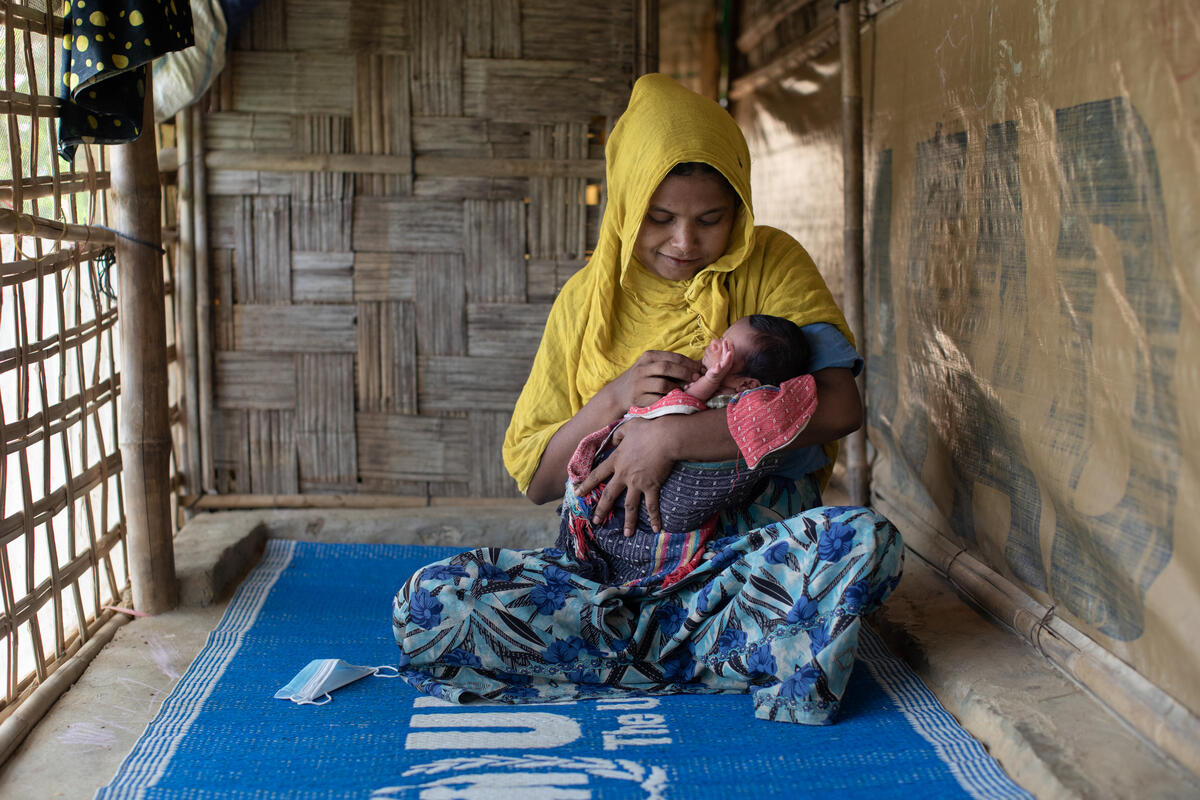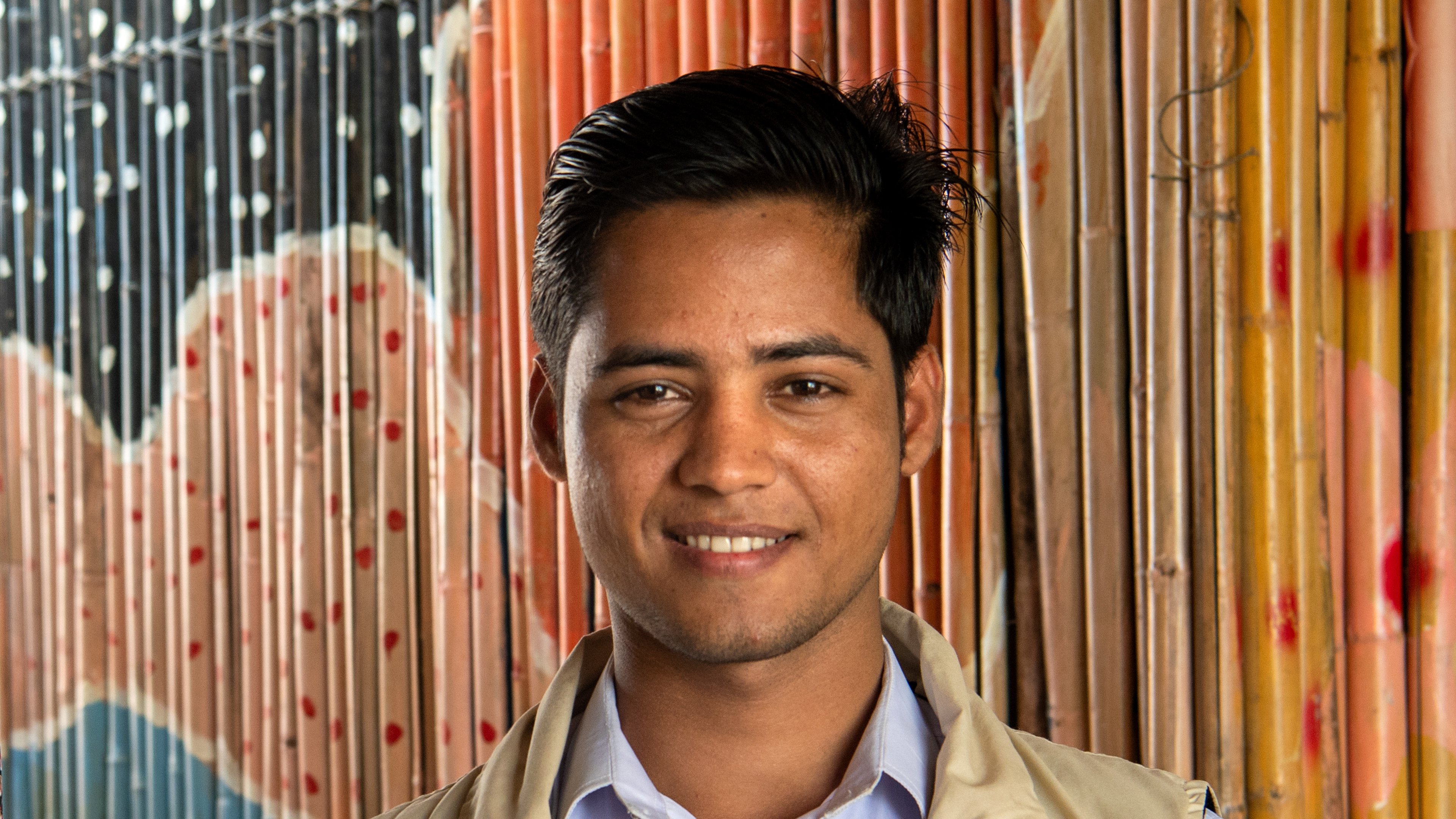Rohingyas from Myanmar living in risky conditions in Bangladesh
Rohingyas from Myanmar living in risky conditions in Bangladesh

TEKNAF, Bangladesh, July 19 (UNHCR) - Perched precariously on the edge of the muddy tidal river flat, with the hills of Myanmar in clear sight across the broad expanse of the Naf river, a group of more than 6,000 Rohingyas from Myanmar are living in extremely risky conditions in Teknaf, Cox's Bazar district in the south-eastern tip of Bangladesh.
"We are really suffering here," said one of the group's Mahjees, or leaders. "When it rains, the rain comes down from the hills behind, and during the high tides, the water comes from that side," he added, gesturing towards the salty Naf river that flows into the Bay of Bengal some kilometres away. He said the water often reached knee height, saturating their shelters.
Constructed from wood from the forest and bits of plastic and thatching, the tattered makeshift homes of this ethnic Muslim group are right on the high tide mark, jammed up against the road. There is no water or sanitation at the site, creating a health hazard particularly for the large number of young children in the group.
Another 20,500 Rohingyas from Myanmar are registered in two government-run camps - Kutu Palong and Nayapara - south of Cox's Bazar town.
In a joint initiative last Friday, UNHCR, the European Commission and diplomats from five donor countries visited the Teknaf group to see their plight for themselves, after urging the Bangladesh government for months to move the group to safer ground.
"They are living in very dangerous and risky conditions, in an area prone to flooding and cyclones during the monsoon," European Commission Ambassador Esko Kentrschynskyj said after the joint mission to Teknaf.

Since late last year, the international community has been asking the government to move the Teknaf group as a matter of urgency, but so far has not received a response. The European Commission has said it will provide emergency humanitarian assistance in water and sanitation once the group is moved to safer ground. However, the government and the local authorities consider the group illegal immigrants and say they should return to Myanmar.
"The Teknaf group of Rohingyas are people of concern to UNHCR, as they fled Myanmar for the same reasons of persecution as the refugees in the camps who came here in a big influx in 1991-1992," explained UNHCR's representative in Bangladesh, Christopher Lee. "The only difference is that these Rohingyas were living outside the camps, or arrived after a 1994 cut-off date for prima facie refugee status, so they were not registered."
"We came to Bangladesh because we had some problems in 1992," said one Mahjee. "In 1994 I repatriated. Our lands were confiscated before and when we repatriated we got some land back. Then it was taken again. Even worse, they brought people, Burmese from Yangon, and settled them on our land. The Myanmar government says, 'You have no nationality, you have no citizenship.' We were forced to leave," he added.
During the refugee exodus in the early 1990s, some 250,000 Rohingyas in Myanmar fled by foot or boat into nearby Bangladesh and were sheltered in 20 camps. An undetermined number settled in the surrounding area. More than 235,000 Rohingyas have since repatriated, leaving the 20,500 currently living in poor conditions in the two government-run camps in Cox's Bazar district.
The Teknaf group formed after the Bangladesh government moved some 3,600 Rohingyas in 2003 from villages in the surrounding areas where they had been living for up to 10 years, to a spot along the Naf river. Six months later, they were moved two kilometres to the current site. The group has been growing as more Rohingyas facing problems with local communities have moved to the area.
The Mahjees said they suffered severe ill-treatment at the hands of the villagers and local authorities before being moved to the current site.
A small number of new arrivals from Myanmar, and some "double backers" - a term used for refugees who repatriated to Myanmar, then fled again - are also part of the group. There are no accurate figures for the composition of the Tefnak group and numbers range from 6,000-10,000 as the size of the group fluctuates.
The Tefnak group struggles to survive in their precarious surroundings. The men try to find work fishing, cutting wood in the forest, or pulling a rickshaw, the main mode of transport in this lush, overpopulated, rural area of Bangladesh.
"We are facing a lot of trouble, especially medical," said another Mahjee. "If we eat one time, we have to starve another and the children are not getting any education. We are Muslims. We came to another Muslim country, but we don't find peace."
The group is also suffering from medical complaints, particularly diarrhoea, but they lack health care and money to buy medicine.
"We are suffering very much," said one woman, dressed in blue instead of the customary black burqa and veil of the Rohingyas. "We don't have rations, food, medicine. We get sick with diarrhoea, we use bark from the tree as medicine. We are dying because of [the lack of] food and water. A lot of people died here. We collect leaves from the forest and cook them for our children. We collect water from the forest and rainwater but it is not enough," the mother of five added.
Members of the joint mission to Teknaf said they would continue to pursue the humanitarian relocation of this group with the government.
By Jennifer Pagonis in Teknaf, Bangladesh








